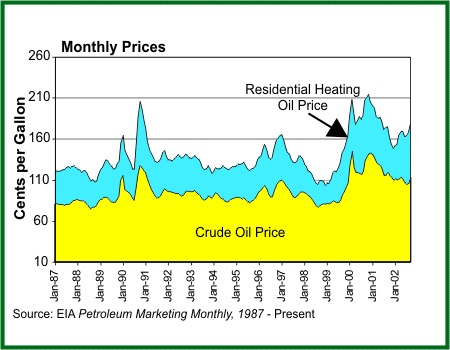


Rising Propane Prices
Propane prices are subject to a number of influences, some common to all petroleum products, and others unique to propane. Because propane is portable, it can serve many different markets, from fueling barbecue grills to producing petrochemicals. The price of propane in these markets is influenced by many factors, including the prices of competing fuels in each market; the distance propane has to travel to reach a customer; and the volumes used by a customer. More especially, propane prices are affected by:
Crude Oil and Natural Gas Prices - Although propane is produced from both crude oil refining and natural gas processing, its price is influenced mainly by the cost of crude oil. This is because propane competes mostly with crude oil-based fuels (Figure 2).
Figure 2. Propane Prices Follow Crude Oil Price Trends

Note: Data are not adjusted for inflation.
Source: Crude Oil: West Texas Intermediate Crude Oil Prices as reported by Reuter
News Service. Propane Prices: Energy Information Administration, Petroleum Marketing
Monthly.
Supply/Demand Balance - Propane supply and demand is subject to changes in domestic production, weather, and inventory levels, among other factors. While propane production is not seasonal, residential demand is highly seasonal. This imbalance causes inventories to be built up during the summer months when consumption is low and for inventories to be drawn down during the winter months when consumption is much higher. When inventories of propane at the start of the winter heating season are low, chances increase that higher propane prices may occur during the winter season.
Colder-than-normal weather can put extra pressure on propane prices during the high demand winter season because there are no readily available sources of increased supply except for imports. And imports may take several weeks to arrive, during which time larger-than-normal withdrawals from inventories may occur, sending prices upward. Cold weather early in the heating season can cause higher prices sooner rather than later, since early inventory withdrawals affect supply availability for the rest of the winter.
Article source: Energy Information Administration (EIA)
Geothermal fuel prices never rise
Since a Geothermal heat pump does not burn any fuel, the price of it will never spike. Geothermal heat pumps use a small amount of electricity to exploit the free heating and cooling found in your backyard. Harvest the power you already have.
Visit this link directory.










